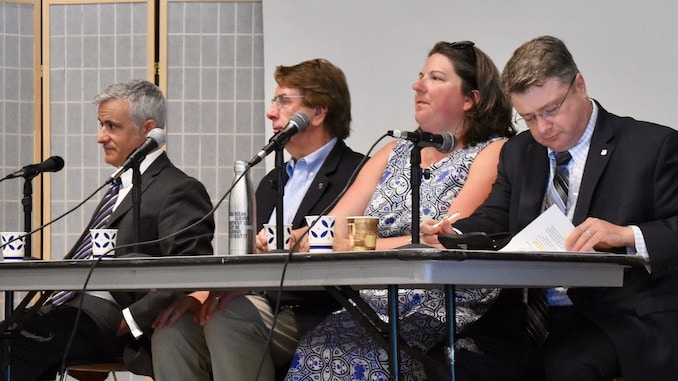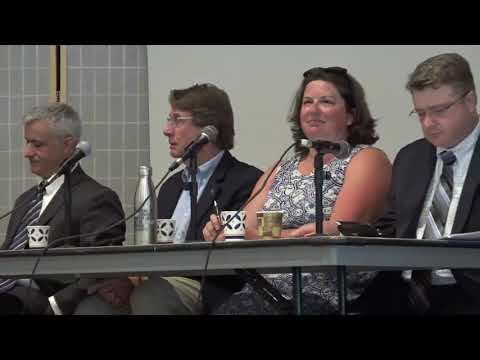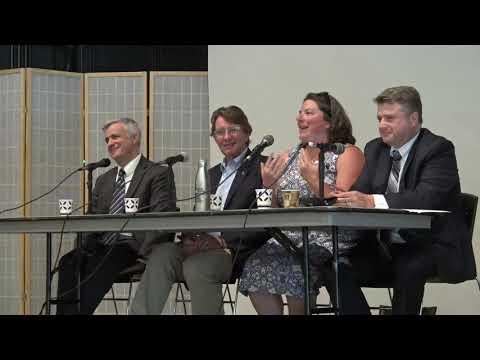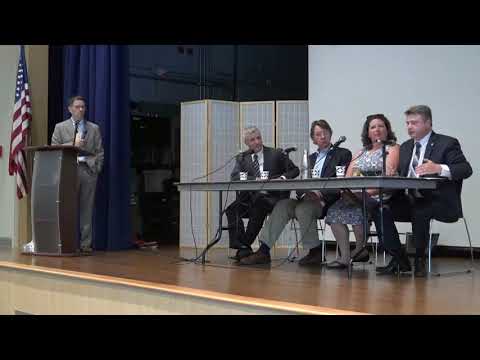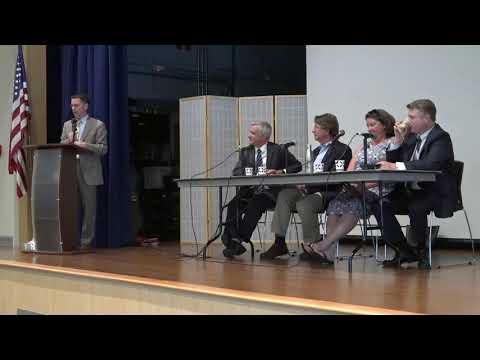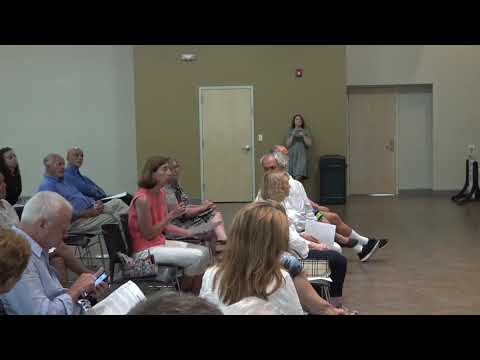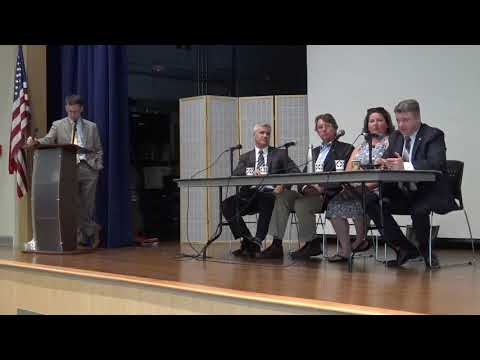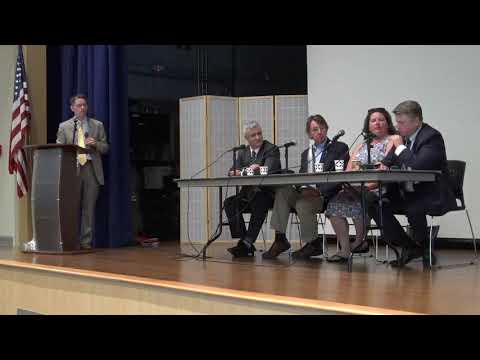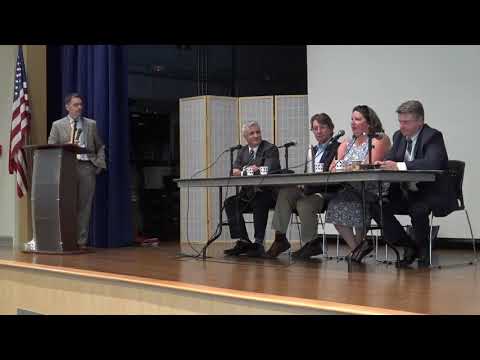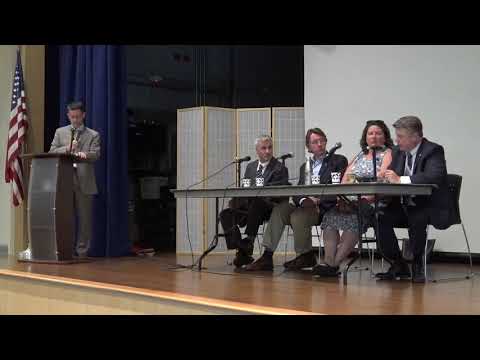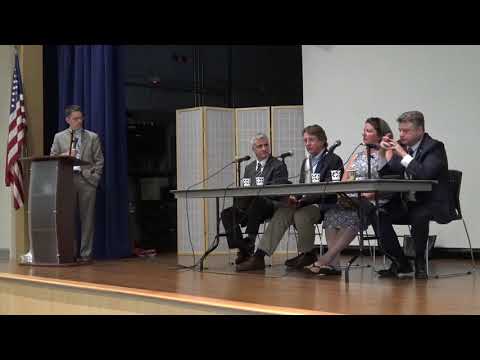State Senators and Representatives reflect on past legislative session with Common Cause
Rhode Island State Senators Dawn Euer (Democrat, District 13, Newport, Jamestown) and James Sheehan (Democrat, District 36, Narragansett) and State Representatives Jason Knight (Democrat, District 67, Barrington, Warren) and John Lyle Jr (Republican, District 46, Lincoln) were on stage Wednesday night to discuss this past year’s legislative session with John Marion, Executive Director of Common Cause Rhode Island. The conversation
July 25, 2019, 12:32 pm
By Steve Ahlquist
Rhode Island State Senators Dawn Euer (Democrat, District 13, Newport, Jamestown) and James Sheehan (Democrat, District 36, Narragansett) and State Representatives Jason Knight (Democrat, District 67, Barrington, Warren) and John Lyle Jr (Republican, District 46, Lincoln) were on stage Wednesday night to discuss this past year’s legislative session with John Marion, Executive Director of Common Cause Rhode Island.
The conversation covered a wide array of topics, mostly centered around open government issues. Below is all the video, arranged by subject matter.
Introductions
Marion began by introducing the panelists.
House and Senate Rules
The past legislative session began with 19 House Democrats denying their support to Representative Nicholas Mattiello (Democrat, District 15, Cranston) as Speaker. The “Reform Caucus” not only refused to support Mattiello as Speaker, they also suggested several changes to the House Rules, the rules by which the House conducts its business.
For a full breakdown of the rules changes supported by the Reform Caucus, see:
“In the past, as you all know, the end of the General Assembly, the last few days, is what I like to call the bill-a-thon,” said Representative Knight. “Both chambers suspend their rules, and we take hundreds and hundreds of votes inside of 24 to 48 hours, depending on how much business there is to do… We don’t want to do that. We don’t want to suspend the rules [so] the public can watch what’s happening and follow along in real time, see things posted appropriately, [and] have some notice to just understand what’s happening, instead of this big massive rush of bills that occurs in the last couple of days.
“This year,” continued Knight, “although the rule didn’t change, [during] the end of the session in the House, we did not suspend the rules. I think that was probably for the first time in living memory we didn’t suspend the rules, and lo and behold, we made it, with some very, very good organizational work by the staff. We managed to get done in an entirely manner while keeping everything posted, while keeping the public informed, and we got through all of our business. I think that’s a real win and I have to think that it’s related to the debate that we had in January.”
“If I could just tack onto that,” said Representative Lyle, “One of the people who was responsible for us not suspending our rules was the Minority Leader Blake Filippi (Republican, District 36, Charlestown, New Shoreham, South Kingstown, Westerly). I really do want to commend him publicly for taking that courageous stand because he was under a lot of pressure, not just from his Democratic colleagues but also from some of us in the Republican caucus as well. A number of us had bills that we wanted to see move, and Blake said, ‘No, we’re not suspending our rules.’ He really stuck to his guns and I have true respect for him.”
Early Voting
Early voting has been introduced to the General Assembly in one form or another sine 2013. It has never gone anywhere. This year the bill died in the Senate and House Judiciary Committees. Early voting would allow voters to go to vote days or even weeks before an election. It avoids the problems of mail-in ballots as the vote is fed directly into the machine while you watch, avoiding the pitfalls of signature matching at the Board of Elections.
“My conversations, particularly on the House side, centered around people who were both nostalgic for wanting to preserve the current system not just out of nostalgia sake but out of self-preservation.’I got elected without early voting, then I don’t want early voting because different people might get elected.'” said Marion. “And I’ll put a name on it which is that there’s a Representative from North Providence, Arthur Corvese (Democrat, District 55, North Providence), who is in the House Judiciary Committee who is very, very vocally opposed to most election changes, and in particular early voting. [Corvese] will say, to your face, he sees it as a threat, to him, politically, and to like-minded conservative Democratic legislators.”
Moving the Primary Date
Rhode Island’s September Primary is the latest Primary in the United States, and under new Federal law, it had to be moved to allow Americans overseas, especially those serving in the Military, 45 days to receive and return their ballots.
Secretary of State Nellie Gorbea asked that the date be moved to August, but the General Assembly balked at that, and moved the Primary date to the day after Labor Day. Moving the Primary date to August makes it easier for the clerks of the various municipalities, prevents having to close schools in September for voting, and most schools are not open in August, and research shows that August primaries have greater voter turnout.
Moving the Primary to the day after Labor Day means that local officials will have to pay workers more money, because the set up in the various polling places will have to be done on a holiday, meaning overtime pay will be required. Schools will still have to be closed, after having just started the school year.
“It’s kind of a lose-lose instead of a win-win,” said Marion.
But the chosen date does comply now with Federal law, at least.
Redistricting
After the next Constitutionally mandated United States Census is completed, states will have a chance to redraw their election maps, a process called redistricting. When done properly, redistricting enhances democracy and makes districts more competitive, allowing new candidates and fresh ideas to enter the General Assembly. When done poorly, it’s called gerrymandering, and it allows those in power to redraw election maps to favor certain political parties or individuals.
Redistricting in Rhode Island this year will be very different than during the last two cycles.
“Last time I was one of the only people, if not the only person in the state, who went to all 28 [public redistricting meetings],” said Marion. “And there weren’t a lot of people in the room with me. I think there’ll be a lot more people in the room this time because I think people are paying closer attention than they were ten years ago.”
Another change? Technology.
“Technology is on our side this time,” said Marion. “Ten years ago technology was such that the people draw the districts, could manipulate them at a very fine grain, but this time we can do it. There are websites that you can log on your phone and draw districts that would be legally acceptable because the computing power has gotten that much better in just a decade. What we hope to do is empower citizens in Rhode Island to draw their own districts and go to those 28 public meetings and say, ‘Hey, here’s my map and it’s better than your map. It’s better than the official one.'”
Laughter from the audience.
“Right?” said Marion. “And call out the gerrymanderers that they’ve seen over the decades. There’s literally a website that you could take their Map the official one, upload it, and it will score [the Map] on a number of different measures of fairness, and then we’ll be able to say, ‘Listen, you score a zero, my map scored 100, so you should use my map.’
“I think there will be a type of pressure that there hasn’t been in the past because the public can participate more fully…”
Public Financing of Elections
A bill introduced by Senator Sheahan would create “democracy vouchers.”
“We all know that money is the Mother’s Milk of politics, and those who have the money have a lot of influence,’ said Senator Sheehan, explaining his bill. “So this was a way to get the average citizen into the process of having some type of input, in this case funding: How do you fund candidates?
“We have in Rhode Island matching funds for a candidate to the
executive branch, you know the Governor on down to the Secretary of State, but there’s nothing for the General Assembly,” continued Sheehan. “John Marion approached me and asked if I wanted to work with Common Cause on bits of legislation that would essentially mimic the fairly successful, though still recent, changes that they did out in Seattle…
“Average citizens would get a voucher, which is worth a certain amount of money, say $25-$50, whatever it may be, and they can get a certain number of them because they will apply for them online, and then they get to give them to any candidate of their choice, whether it’s a primary race or whether it’s a General race,” concluded Sheehan. “That would give them the ability to participate in the process more or less on level footing with those who are already contributing but the charm of it is it would make politicians less dependent upon special interest money and more dependent upon the voters, the average voter. And if politicians owe the average voter, that’s a good thing.
“That’s a win…”
Magistrates
A magistrate is a judge by another name, said Representatively Lyle. “…[e]ffectively they are serving as a judiciary officer. They are appointed by the [Chief Judge of the Court, as opposed to the Governor]. They are bypassing the the judicial appointing authority and circumventing them by appointing these politically connected individuals to those positions.”
Lyle expressed concern that reforming the system might subject members of the General Assembly, who as lawyers might have to appear before these magistrates, to some sort of repercussions. These possible repercussions perhaps make it difficult for the General Assembly to do something about this.
Optimally, Magistrates, like Judges, would be appointed by the Governor and confirmed by the Senate Judiciary Committee.
Casino Gambling
Asked about the chances that the General Assembly would reconvene in the fall to take up the issue of casino gambling and the two proposals being bandied about by Twin River and IGT, companies that have both engaged in secret, no-bid, back room negotiations with state leaders, all four elected officials on stage thought it to be unlikely.
Ranked Choice Voting
A question from the audience about ranked choice voting.
Final Comments
Here are the final comments from the panel:
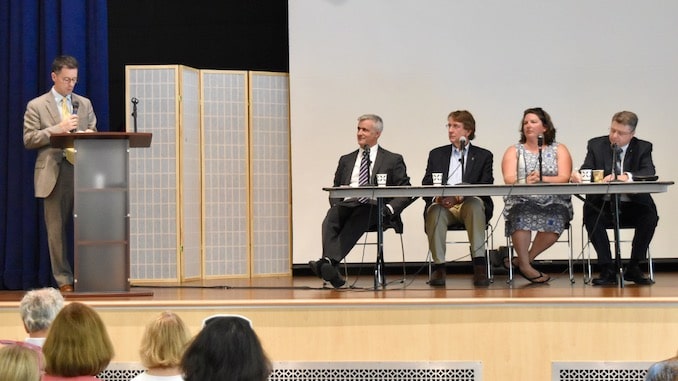
UpriseRI is entirely supported by donations and advertising. Every little bit helps:
Become a Patron!



